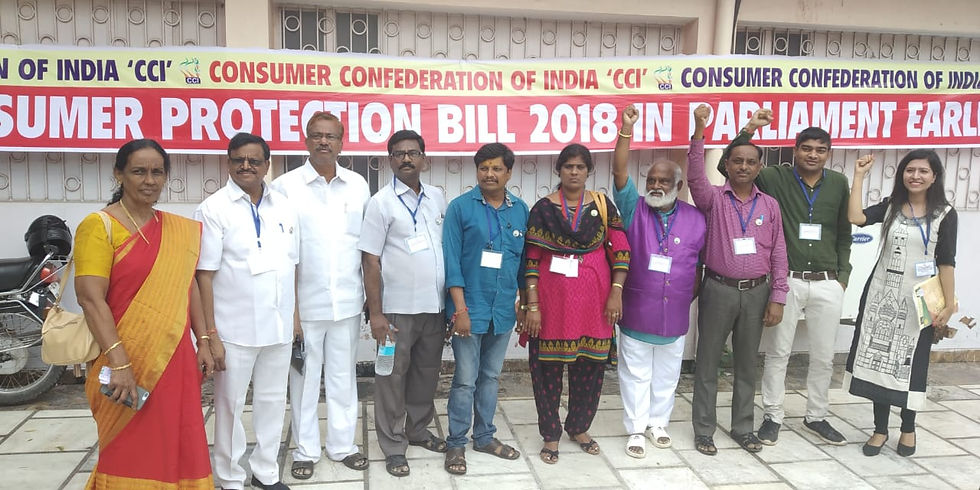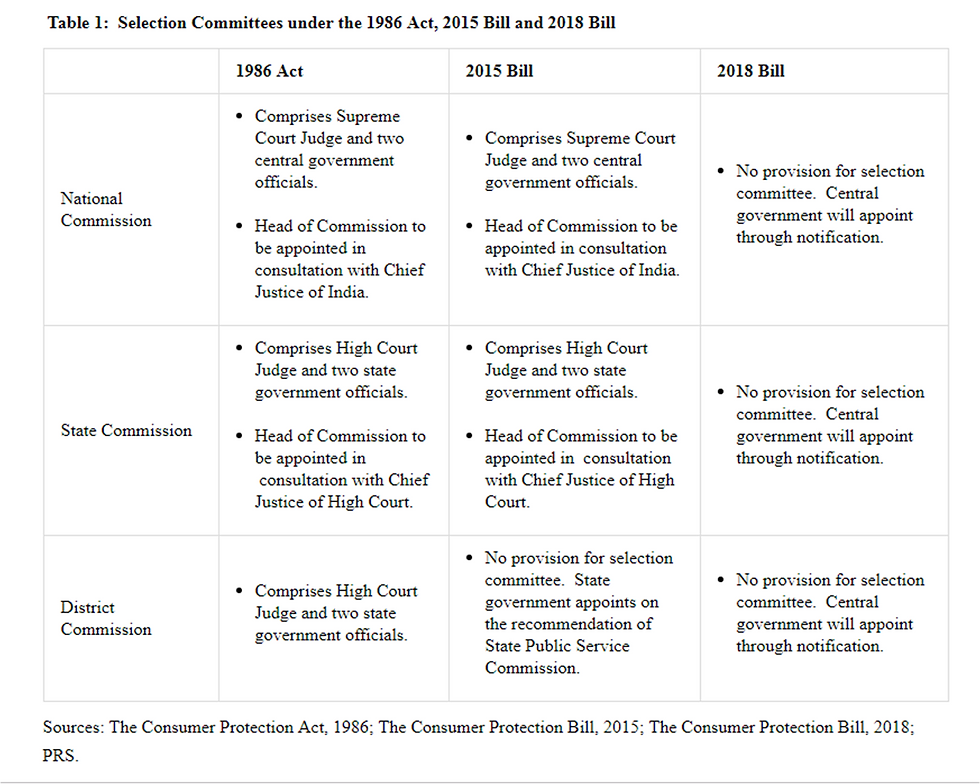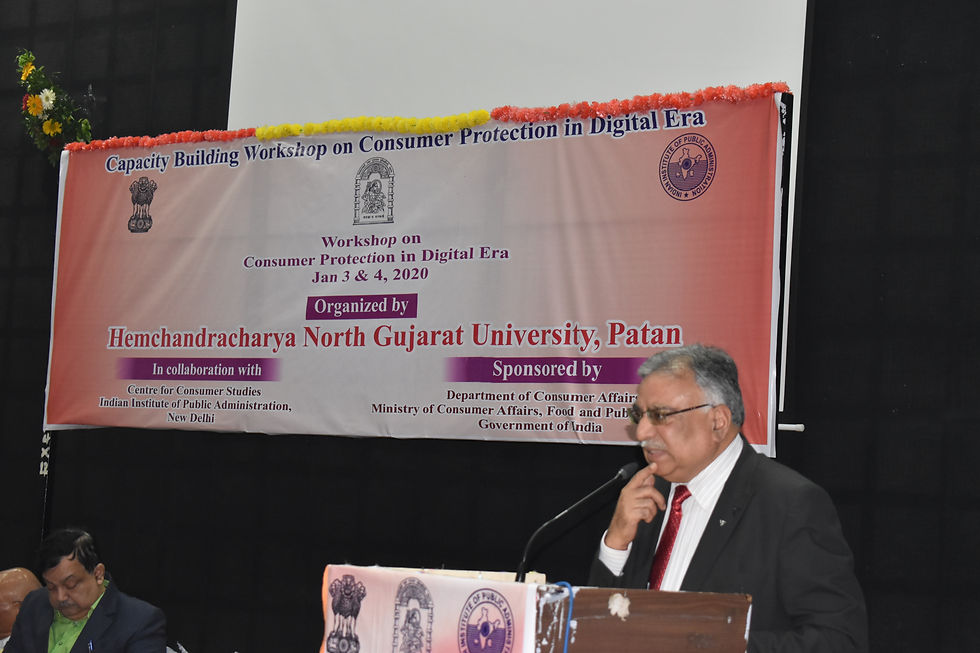Consumer Protection Bill 2018
- Ashwinkumar Modi

- Dec 17, 2020
- 11 min read

દેશના ગ્રાહકો માટે એક મોટી જીત, આજે “કન્ઝ્યુમર પ્રોટેક્શન એક્ટ 2018 બીલ” લોકસભા માં પસાર થઇ ગયેલ છે. અને હવે તે રાજ્યસભામાં પસાર થશે. કે આ બીલ ને ઝડપથી પાસ કરાવવા જાગૃત ગ્રાહક મંડળ પાટણ અને ભારતના ગ્રાહક સુરક્ષા સંસ્થાઓ દ્વ્રારા રાષ્ટ્રવ્યાપી અભિયાન કરી રહ્યા હતા. જે મુજબ Consumer Confederation of India (CCI) ની આગેવાની માં તારીખ 23 સપ્ટેમ્બર પર જયપુરમાં ગ્રાહક ચળવળ વતી રાષ્ટ્રીય સ્તરીય સેમીનાર અને વર્કશોપ રાખેલ હતો. જે પ્રમાણે દેશ ના ગ્રાહક સુરક્ષા સંસ્થાઓના પ્રતિનિધીઓ ના વિચાર, વિમર્સ, અને નિર્ણયો સરકાર સુધી પહોચાડ્યા હતા.
Highlights of the Bill
The Bill replaces the Consumer Protection Act, 1986. The Bill enforces consumer rights, and provides a mechanism for redressal of complaints regarding defect in goods and deficiency in services.Consumer Disputes Redressal Commissions will be set up at the District, State and National levels for adjudicating consumer complaints. Appeals from the District and State Commissions will be heard at the next level and from the National Commission by the Supreme Court.The Bill sets up a Central Consumer Protection Authority to promote, protect and enforce consumer rights as a class. It can issue safety notices for goods and services, order refunds, recall goods and rule against misleading advertisements.If a consumer suffers an injury from a defect in a good or a deficiency in service, he may file a claim of product liability against the manufacturer, the seller, or the service provider. The Bill defines contracts as ‘unfair’ if they significantly affect the rights of consumers. It also defines unfair and restrictive trade practices.The Bill establishes Consumer Protection Councils at the district, state and national levels to render advise on consumer protection.
Key Issues and Analysis
The Bill sets up the Consumer Disputes Redressal Commissions as quasi-judicial bodies to adjudicate disputes. The Bill empowers the central government to appoint members to these Commissions. The Bill does not specify that the Commissions will comprise a judicial member. If the Commissions were to have members only from the executive, the principal of separation of powers may be violated.The Bill empowers the central government to appoint, remove and prescribe conditions of service for members of the District, State and National Consumer Disputes Redressal Commissions. The Bill leaves the composition of the Commissions to the central government. This could affect the independence of these quasi-judicial bodies.Consumer Protection Councils will be set up at the district, state, and national level, as advisory bodies. The State and National Councils are headed by Ministers in-charge of Consumer Affairs. The Bill does not specify whom the Councils will advise. If the Councils advise the government, it is unclear in what capacity such advice will be given.
PART A: HIGHLIGHTS OF THE BILL
Context
The Consumer Protection Act, 1986 enforces rights of consumers, and provides for redressal of complaints at the district, state and national level.[1] Such complaints may be regarding defects in goods or deficiency in services. The Act also recognises offences such as unfair trade practices, which include providing false information regarding the quality or quantity of a good or service, and misleading advertisements.
Over the years, there have been challenges in the implementation of the Act. A high number of consumers were unaware of their rights under the Act.[2] While the disposal rate of consumer cases was high (about 90%), the time taken for their disposal was long.[3],[4] It took 12 months on an average to resolve a consumer case.4 Also, the Act does not address consumer contracts between a consumer and manufacturer that contain unfair terms. In this context, the Law Commission of India had recommended that a separate law be enacted and presented a draft Bill in relation to unfair contract terms.[5]
In 2011, a Bill to amend the 1986 Act was introduced to enable consumers to file online complaints, and against unfair terms in a contract. However, the Bill lapsed with the dissolution of the 15th Lok Sabha.[6] The Consumer Protection Bill, 2015 was introduced in Lok Sabha to replace the 1986 Act.[7] The Bill introduced various new provisions, which included: (i) product liability; (ii) unfair contracts; and (iii) setting up of a regulatory body. The Bill was examined by the Standing Committee on Consumer Affairs which submitted its report in April 2016.[8] The Committee gave several recommendations with regard to: (i) product liability; (ii) powers and functions of the regulatory body (Central Consumer Protection Authority) being set up; (iii) penalties for misleading advertisements and endorsers of such advertisements; and (iv) pecuniary jurisdiction of the adjudicatory body at the district level. The Consumer Protection Bill, 2018 was introduced in January 2018 to replace the 2015 Bill.
Key Features
Consumer Complaints
The Bill sets up Consumer Disputes Redressal Commissions (consumer courts) to hear complaints on matters like: (i) defect in goods or deficiency in services; (ii) unfair or restrictive trade practices; (iii) excessive pricing; (iv) knowingly selling goods or providing services that do not meet safety norms; and (v) product liability. Such complaints can be filed electronically and from where the complainant resides or works.These Commissions will be set up at District, State and National level, with pecuniary jurisdiction up to Rs one crore, Rs one crore to Rs 10 crore, and above Rs 10 crore, respectively. In case of unfair contracts, the State Commissions will hear complaints where the value is up to Rs 10 crore, and National Commissions will hear complaints above that value. These Commissions can declare unfair terms of such contracts to be null and void.Appeals from the District Commissions will be heard by the State Commission, and from the State Commission by the National Commission. Appeals from the National Commission will be heard by the Supreme Court.The Commissions will attempt to dispose a complaint within three months, if the complaint does not require analysis or testing of commodities. If analysis and testing is required, the complaint will be disposed within a period of five months.The District Commissions will consist of a President and at least two members. The State and National Commissions will consist of a President and at least four members. The qualifications, tenure, and method of appointment and removal of the President and members of these Commissions will be prescribed by central government through notification.The Bill also provides for mediation cells attached to the District, State and National Commissions. The Commissions may refer a matter for mediation if the parties consent to settle their dispute in this manner.
Other Bodies established under the Bill
Central Consumer Protection Authority: The Bill sets up the Central Consumer Protection Authority (CCPA) to promote, protect, and enforce the rights of consumers as a class. It will be headed by a Chief Commissioner and comprise other Commissioners. It will have an investigation arm headed by a Director General. It may: (i) issue safety notices; (ii) pass orders to recall goods, prevent unfair and restrictive trade practices; (iii) reimburse purchase price paid; and (iv) impose penalties for false and misleading advertisements. It may also file complaints before the Consumer Disputes Redressal Commissions.Consumer Protection Councils: The Bill sets up Consumer Protection Councils (CPCs) at the district, state, and national levels as advisory bodies. The Councils will advise on promotion and protection of consumer rights. Under the Bill, the Central and State Council will be headed by the Minister-in-charge of Consumer Affairs at the central and state level, respectively. The District Council will be headed by the District Collector.
Product Liability
The Bill allows a person to make a claim of product liability against a manufacturer, seller, or service provider for any defect in a product or deficiency in a service. A claim for compensation may be made for any harm caused, including: (i) property damage; (ii) personal injury, illness, or death; and (iii) mental agony or emotional harm accompanying these conditions.
Unfair contracts
A contract is said to be unfair if it causes significant change in the rights of the consumer, which include the following: (i) requiring excessive security deposits; (ii) imposing a disproportionate penalty for a breach in contract; (iii) refusing to accept early repayment of debts; (iv) terminating the contract without reasonable cause; (v) transferring a contract to a third party to the detriment of the consumer without his consent; or (vi) imposing unreasonable charge or obligations which put the consumer at a disadvantage.The State and National Commissions may determine if the terms of a contract are unfair and declare such terms to be null and void.
Unfair and restrictive trade practices
An unfair trade practice includes: (i) making a false statement regarding the quality or standard of a good or service; (ii) selling of goods not complying with standards; (iii) manufacture of spurious goods; (iv) non-issuance of a receipt for a good or service sold; (v) refusing to withdraw or refund goods or services within 30 days; or (vi) disclosing personal information provided by a consumer to any other person.A restrictive trade practice is one that imposes unjustified costs or restrictions on consumers, including: (i) delays in supply that lead to increase in price; and (ii) requiring purchase of certain goods or services as a condition for procuring any other goods or services.The CCPA may take steps to prevent and discontinue unfair and restrictive trade practices. The District, State or NationalCommissions may order the discontinuation of unfair and restrictive trade practices.
Penalties
If a person does not comply with the orders of the District, State or National Commissions, he may face imprisonment up to three years, or a fine not less than Rs 25,000 extendable to Rs one lakh, or both.If a person does not comply with an order issued by the CCPA, he may face imprisonment of up to six months, or a fine of up to Rs 20 lakh, or both.For false and misleading advertisements, a penalty of up to Rs 10 lakh may be imposed on a manufacturer or an endorser. For a subsequent offence, the fine may extend to Rs 50 lakh. The manufacturer can also be punished with imprisonment of up to two years, which may extend to five years in case of every subsequent offence. The CCPA can also prohibit the endorser of a misleading advertisement from endorsing any particular product or service for a period of up to one year. For every subsequent offence, the period of prohibition may extend to three years. There are certain exceptions when an endorser will not be held liable for such a penalty.The CCPA may also impose penalties for manufacturing, selling, storing, distributing or importing adulterated products. The penalties are as follows: (i) if injury is not caused to a consumer, the penalty would be a fine of up to Rs one lakh along with imprisonment of up to six months; (ii) if injury is caused, penalty would be a fine up to Rs three lakh along with imprisonment of up to one year; (iii) if grievous hurt is caused, penalty would be a fine up to Rs five lakh along with imprisonment up to seven years; and (iv) in case of death, penalty would be Rs ten lakh or more along with a minimum imprisonment of seven years, extendable to imprisonment for life.The CCPA may also impose penalties for manufacturing, selling, storing, distributing or importing spurious goods. The penalties are as follow: (i) if injury is caused, penalty would be a fine up to Rs three lakh along with imprisonment of up to one year; (ii) if grievous hurt is caused, penalty would be a fine up to Rs five lakh along with imprisonment up to seven years; and (iii) in case of death, penalty would be Rs ten lakh or more along with a minimum imprisonment of seven years, extendable to imprisonment for life.
PART B: KEY ISSUES AND ANALYSIS
Composition of the Consumer Disputes Redressal Commissions
The Bill sets up Consumer Disputes Redressal Commissions (consumer courts) at the district, state and national level, as quasi-judicial bodies for adjudication of consumer disputes. We discuss some issues with regard to the composition of these Commissions and method of appointment of the members.
Composition of the Commissions could violate the principle of separation of powers
The District, State and National Consumer Disputes Redressal Commissions will adjudicate complaints on defective goods and deficient services of varying values. They have been given the powers of a civil court. The State and National Commissions act as appellate bodies on the decisions of the District and State Commissions, respectively. Appeals from the National Commission will be heard by the Supreme Court. Therefore, these Commissions are quasi-judicial bodies with the National Commission being on par with High Courts.
The Bill specifies that the Commissions will be headed by a ‘President’ and will comprise other members. However, the Bill delegates to the central government the power of deciding the qualifications of the President and members. In particular, the Bill does not specify that the President or members should have minimum judicial qualifications. This is in contrast with the existing Consumer Protection Act, 1986, which states that the District Commission will be headed by a person qualified to be a district judge. Similarly, the State and National Commissions are headed by a person qualified to be a High Court or a Supreme Court judge, respectively. The 1986 Act also specifies the minimum qualification of members. The earlier 2015 Bill too specified judicial members to head the State and National Commissions, though it permitted the District Commission to be headed by the district magistrate in addition to a person qualified to be a district judge.
If the Commissions were to have only non-judicial members, it may violate the principle of separation of powers. One may also argue that prescribing the qualifications through Rules may be an excessive delegation of powers. The Supreme Court has held that in the absence of standards, criteria or principles on the contents of rules, the powers given to the executive may go beyond the permissible limits of valid delegation.[9]
Executive involvement in the appointment of Commissions may affect judicial independence
The Bill permits the central government to notify the method of appointment of members of the Commissions. There is no requirement that the selection involve the higher judiciary. It may be argued that allowing the executive to determine the appointment of the members of Commissions could affect the independent functioning of the Commissions. With regard to Appellate Tribunals, such as the National Tax Tribunal, the Supreme Court has held that they have similar powers and functions as that of High Courts and hence matters related to appointment and tenure must be free from executive involvement.[10] The Bill is not in line with this direction of the Supreme Court.
The 1986 Act contains provisions on selection committees that would appoint members on these Commissions. This method of selection was also specified in the 2015 Bill. These selection committees were chaired by a judicial member. The 2018 Bill does not set up such selection committees and leaves it to the central government to appoint members of the Commissions. Table 1 sets out the composition of these selection committees under the existing and proposed law.

Composition and role of the Consumer Protection Councils
The Bill establishes Consumer Protection Councils (CPCs) at the district, state and national levels, as advisory bodies. The Councils will advise on promotion and protection of consumer rights. Under the Bill, the Central Council and the State Council will be headed by the Minister-in-charge of Consumer Affairs at the central and state level, respectively. The District Council will be headed by the District Collector.
The Bill states that these bodies shall “render advice on promotion and protection of consumer rights”. It is unusual for a body headed by a Minister or the District Collector (who are implementing authorities) to be given an advisory role. Further, the Bill does not specify whom the CPCs will render the advise to.
The 1986 Act provides for such Councils but their role is to promote and protect consumer rights (which is not an advisory role). The Bill has vested the Central Consumer Protection Authority with this duty.
Other Standing Committee recommendations not addressed
The Standing Committee that examined the Consumer Protection Bill, 2015 gave several recommendations. While several recommendations have been included in the 2018 Bill, the following recommendations have not been included.
The right to terminate a contract on the grounds of quality of goods or services received should be included under consumer rights outlined in the Bill. It reasoned that under the Sale of Goods Act, 1930, the buyer has certain rights to terminate the contract, and the Bill should have a similar provision for consumers.In order to facilitate early disposal of cases, involvement of advocates in complaints involving compensation value of up to Rs 20 lakh should be prohibited. It attributed inordinate delay in disposal of cases to deployment of advocates, and consequently recommended prohibition on their involvement in certain cases.The Standing Committee noted that Consumer Commissions do not admit complaints in relation to services to which a special law applies. It recommended that a provision may be inserted to clarify that the proposed Bill will apply to any matter covered under a special law, unless the special law excludes the application of the proposed Bill.The advertising code presently being followed by the Advertising Standards Council of India (ASCI) should be given legal backing. It recommended that a provision may be incorporated in the Bill to the effect that the misleading advertiser is compelled to issue a corrective advertisement.







Comments